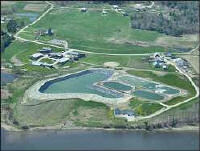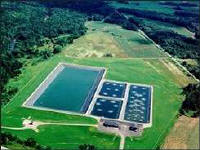 |
|
 |
| Mission | Search | Acknowledgements | Discussion Group | Contact Us | Links | ||
| ||||||
|
Maine DEP Monthly
Maine and WEF's
Penobscot Watershed and Development of a TMDL
Maine Rural Water
Maine
Wastewater Control Association |
Operators of small rural treatment systems join forces to hold lagoon training sessions
The phone rings on a Saturday at 2:30 a.m. It is a dispatch call from the plant. The dispatcher says, "I know you're on vacation, and I'm really sorry, but I had to call you. I can't reach Rick and the pager is out of service. That storm hit his part of town pretty hard." "Okay," you say. "I'll check the plant and head over to Rick's to check on him." It looks like you'll just have to start the family camping trip one day later. If you have never worked at a small to medium-sized wastewater treatment plant, you probably never received a call like this. However, if you live and work in a rural area, you definitely can identify with the above situation. The small system operator's job requires a commitment that few professions demand. Although small community facilities face the same problems that large systems do, such as keeping up with the latest regulations and technologies, many rural systems are staffed by two to three workers responsible for water and wastewater operations. These operators cannot end their days at 3:30 p.m., and with so many responsibilities, many find it difficult to participate in meetings and training sessions. To meet the needs of such operators, the National Rural Water Association (NRWA) and its state affiliates manage a circuit-rider program throughout the United States. In the program, which began in the 1970s, the circuit rider's responsibilities are fashioned after the circuit judge of the Old West who traveled from territory to territory handing out justice. Likewise, each rider's job is to provide technical assistance to water and wastewater systems, including training. Last year, NWRA circuit riders paid more than 51,300 calls to rural communities. As the circuit rider in Maine, the author visits 35 to 40 wastewater treatment facilities each month. Maine's Lagoons The Maine Department of Environmental Protection (DEP) requires operators to be certified. To be certified, operators are required to receive 18 hours of training within a 2-year period. Although Maine has nearly 50 lagoon systems, training sessions for such systems were scarce before June 1997. Lagoon operators from seven Maine communities and the author met to discuss this dilemma. Ways to overcome training obstacles, such as the limited time that could be spent away from the facility, training costs, and small workforces, were discussed. For example, most existing training sessions took place in the southern part of the state, and most lagoon plants are located approximately 3 to 4 hours driving time from these sessions, which made attending them difficult for system personnel. In addition, the cost of some training was high. The operators decided their goal was to provide affordable training at easily accessible locations. While hiring professional trainers was out of the question, the participants realized that they could recruit operators from within the state to provide the necessary training. After all, not only had many experienced operators already read the books and taken numerous courses, they were familiar with the "real world" issues of wastewater treatment. The group agreed that a half-day training session, coupled with an afternoon facility tour, was the best way to fulfill training needs without taking up too much time or money. A Day at the Lagoon On September 10, 1997, 30 wastewater treatment system operators from across the state attended the first annual session, called "A Day at the Lagoon", in Guilford, Maine. The session focused on solids removal and disposal. Most state lagoon systems were not designed with solids removal and disposal capabilities. The two-course session was conducted in the Guilford treatment plant's maintenance garage, which was supplied with chairs, tables, an overhead projector, and slide projector. About 30 operators, each paying $20 to cover basic administrative costs and food, attended the session. The first course, conducted by volunteer Rob Gundersen, superintendent of the Bethel, Maine Wastewater Treatment Plant, included a slide show and photograph display of reed beds used for solids dewatering. Gundersen provided several free tips for reed bed maintenance, including spring planting, providing plenty of water, and controlling aphid populations. Steve Lane, superintendent of the Millinocket Wastewater Treatment Facility, conducted the second course on physical solids removal, including proper solids-handling techniques. The course involved draining a lagoon and having solids drawn out using a large vactor truck. The truck simultaneously sucked out solids while pumping solids to a sand drying bed about 600 ft (180m) away. The second half of the day consisted of a plant tour, which included a first-hand look at Guilford's reed bed, which was under construction. On the tour, superintendent Frank Ruksznis explained how he chose to pump solids from the lagoon to the reed bed on an ongoing basis to avoid dredging costs in the future. Ruksznis also showed the group the results of a miniature reed bed used as a pilot study. The reeds were healthy and over 7 ft (2m) tall. Plant staff had been feeding solids from Guilford's lagoons to the reed bed for some time. Ruksznis explained how he used the pilot study results in his decision to implement a full reed bed system that will postpone biosolids disposal until the bed needs to be cleaned out. The training session was a success, especially because it provided the opportunity for much interaction among presenters and attendees. The DEP approved six operator certification training credits for this session. The knowledge shared among operators encouraged the organizing committee to hold a second Lagoon Day in 1998. This second session, held in June at the Town of Millinocket Wastewater Treatment Plant, focused on the topic of pond aeration. This time, presentations were conducted by several of the seven "pioneers" of the first training session. Lagoon operators brought aeration equipment from their respective plants on trailers, including complete surface-aeration apparatus. Representatives from two aeration equipment manufacturers ' Randall Chan from Environmental Dynamics Inc. of Columbia, MO, and Keith Davies from Wescor Associates of Boston, MA ' were invited to provide presentations on their products and proper aeration techniques. Several operators who work with different types of aeration systems ' fine-bubble to surface aeration ' discussed their experiences. A tour of the treatment plant, its aerated lagoons, and 20,000 ft2 (1800m2) of sand drying beds was conducted in the afternoon. Training Plans for the Future The training sessions were successful primarily because treatment plant operators had the opportunity to talk to each other about the problems and solutions in lagoon operation and maintenance. In addition, networking is definitely the most popular and successful way for operators to get the most out of these sessions. Four DEP workers, three of whom are facility inspectors, attended the second session, were pleased to see what the operators were learning, and appreciated the fact that the organizers had taken the initiative to help satisfy the need for lagoon training. Richard Darling, a Maine DEP environmental engineering specialist who also coordinates the state certification and training program, says that although training opportunities for Maine lagoon operators have increased in the last several years, more needs to be done, and no plans exist to create a grade of certification specifically for operators who work with such systems. James Sohns, another DEP specialist who attended the second training session, routinely inspects treatment plants as one of his work responsibilities. Although any type of training can only help, Sohns says training should be geared toward the operation one is seeking to learn and improve, and more training sessions can cover this need. Lagoon Task Force The training sessions are not the only fruitful efforts taken by the state and operators. The need for better understanding of lagoon systems in Maine's climate, as well as lagoon operator concerns, prompted the Maine DEP Bureau of Land and Water Quality to form a lagoon task force committee in 1994. The committee, which consists of engineers, DEP officials, and lagoon operators (including many who attended the training sessions), evaluated the performance of wastewater treatment lagoon systems and recommended solutions to problems. In August 1997, the committee released a 123-page user's manual, Design, Operation & Regulation of Aerated Facultative Lagoons in Maine. Operators in other states looking for low-cost,
effective training may consider what Maine operators have done. No matter what
type of facility you are operating, some of the best information and innovative
ideas are picked up by networking with fellow operators. Gerald Kamke is a wastewater technician in the Circuit Rider Program of the Maine Rural Water Association in Brunswick, Maine.
|
|